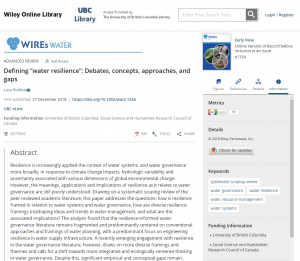
EDGES alumna Lucy Rodina published an article titled “Defining “water resilience”: Debates, concepts, approaches, and gaps” in Wiley Interdisciplinary Reviews: Water.
Abstract: Resilience is increasingly applied the context of water systems, and water governance more broadly, in response to climate change impacts, hydrologic variability and uncertainty associated with various dimensions of global environmental change. However, the meanings, applications and implications of resilience as it relates to water governance are still poorly understood. Drawing on a systematic scoping review of the peer‐reviewed academic literature, this paper addresses the questions: how is resilience framed in relation to water systems and water governance, how are diverse resilience framings (re)shaping ideas and trends in water management, and what are the associated implications? The analysis found that the resilience‐informed water governance literature remains fragmented and predominantly centered on conventional approaches and framings of water planning, with a predominant focus on engineering resilience in water supply infrastructure. A recently emerging engagement with resilience in the water governance literature, however, draws on more diverse framings and theories and calls for a shift towards more integrative and ecologically‐centered thinking in water governance. Despite this, significant empirical and conceptual gaps remain, particularly around the integration of the various subsectors of water governance and, more importantly, around the institutional and governance dimensions of building water resilience.
Rodina, L. (2018). Defining “water resilience”: Debates, concepts, approaches, and gaps. Wiley Interdisciplinary Reviews: Water, 1-18. http://doi.org/10.1002/wat2.
To view full article, click here: